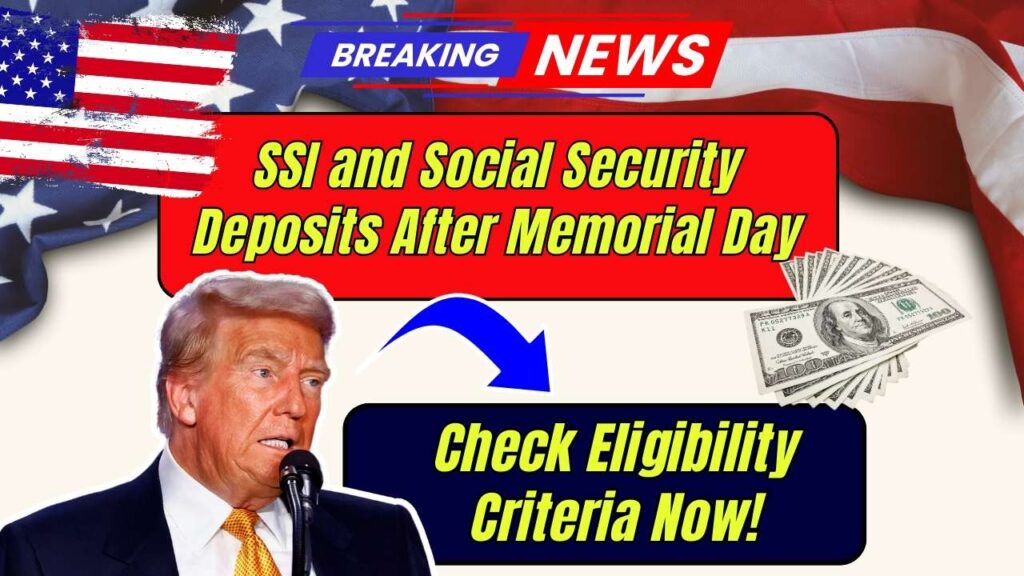SSI and Social Security Deposits After Memorial Day: Check Your Payment Dates and Eligibility Criteria!
SSI and Social Security Deposits After Memorial Day – When it comes to Social Security payments and Supplemental Security Income (SSI), timing is everything—especially right after holidays like Memorial Day. Many folks wonder, “When will my money hit the account? Am I still eligible? Are there any changes I should know about?” Whether you’re a retiree, a disabled worker, or someone relying on SSI, knowing exactly when your benefits are coming and what to expect is key to keeping your finances smooth and stress-free.

In this article, we’re breaking down everything you need to know about SSI and Social Security deposits after Memorial Day 2025, including how payment schedules work, eligibility criteria, common pitfalls, and tips to make sure you’re on top of your benefits game. Stick around—this one’s packed with clear advice and practical steps that anyone can understand, no matter if you’re new to the system or a seasoned pro.
SSI and Social Security Deposits After Memorial Day
| Topic | Details |
|---|---|
| Social Security Payment Dates | Payments are based on birthdates; May payments fall on May 14, 21, and 28. |
| SSI Payment Dates | SSI payments are typically on the 1st of the month but moved earlier if it falls on weekend/holiday; June’s payment on May 30, 2025. |
| Payment Adjustments | Up to 15% garnishment possible for unpaid federal student loans, but not below $750/month. |
| Eligibility Criteria | Based on work credits, income, disability status, and resource limits (for SSI). |
| Important Reminder | If payment date falls on weekend/holiday, payments arrive the prior business day. |
| Official Reference | For full details and schedules, visit ssa.gov. |
Understanding your SSI and Social Security deposits after Memorial Day might sound like a snooze fest, but it’s the kind of knowledge that keeps your money coming in right when you need it. Remember, knowing your payment schedule, staying on top of eligibility, and keeping your info current are the keys to a stress-free benefits experience.
The government’s got your back with adjusted payment schedules around holidays, but it never hurts to stay one step ahead. Signing up for direct deposit, regularly checking your SSA account, and understanding potential deductions like student loan garnishments can save you from surprises.
What’s the Deal with Social Security and SSI Payments After Memorial Day?
Every year, around Memorial Day, people start thinking about how the holiday affects their Social Security and SSI payments. Since the federal government treats certain holidays like Memorial Day as non-business days, it impacts when payments get deposited.
Here’s the lowdown: Social Security payments are typically staggered throughout the month based on your birthday. For May 2025, the payment schedule is:
- May 14: For folks born between the 1st and 10th.
- May 21: For folks born between the 11th and 20th.
- May 28: For folks born between the 21st and 31st.
Now, if your birthday falls early or you’ve been receiving Social Security benefits since before May 1997, or if you’re on both Social Security and SSI, your payments come out on the 3rd of every month. But watch out — if the 3rd falls on a weekend or holiday (like May 3, 2025, which is a Saturday), payments drop the business day before — which was May 2 in this case.
SSI payments work a bit differently. They’re scheduled for the 1st of every month, but if the 1st is a weekend or federal holiday, the payment is shifted earlier. So, in 2025, the June SSI payment will land on May 30 instead of June 1, since June 1 falls on a Sunday.
This scheduling shuffle ensures you don’t get shortchanged by holidays, keeping your benefits coming regularly — no surprises, no hassle.
Key Differences Between Social Security and SSI Payments
To keep things crystal clear, let’s break down the main distinctions:
Social Security
- Funded through payroll taxes (FICA).
- Based on your work history and earnings.
- Payment dates depend on your birthdate or benefit type.
- Includes retirement, disability, and survivors benefits.
Supplemental Security Income (SSI)
- Needs-based program for seniors, disabled, or blind people with limited income/resources.
- Funded through general tax revenues.
- Fixed monthly payment amount, adjusted by living arrangements and income.
- Paid on the 1st of each month (or adjusted for holidays/weekends).
Understanding these differences will help you know which payment schedule applies to you and why.
Why Do Some People See Payment Reductions After Memorial Day?
Here’s a tough but important piece of news for some beneficiaries: if you’ve defaulted on a federal student loan, the government can garnish up to 15% of your monthly Social Security benefits. That’s right — they can take a chunk out of your check to cover past-due student loans.
But don’t freak out — there’s a safeguard in place. The monthly payment can’t be reduced below $750 due to garnishments. So, you still get a decent base amount to cover your essentials.
If you’re in this boat, it’s crucial to reach out to your loan servicer or the Department of Education ASAP to explore repayment plans, rehabilitation options, or even potential loan forgiveness programs. Staying ahead here can save you from unwanted surprises in your bank account.
How to Check Your Payment Dates and Eligibility Like a Pro?
Navigating Social Security and SSI can feel like decoding a secret handshake, but it doesn’t have to be that way. Here are clear steps you can take to keep your benefits on point:
1. Know Your Payment Schedule
- Visit the Social Security Administration (SSA) website at ssa.gov/pubs/calendar.htm to check exact payment dates for the year.
- Remember that birthdate affects Social Security payment day, while SSI payments stick to the 1st (adjusted for holidays/weekends).
2. Sign Up for Direct Deposit
- Get your money faster and safer by having your payments deposited directly into your bank account.
- This also avoids lost or delayed checks due to postal issues.
3. Verify Your Eligibility Annually
- Social Security benefits depend on your earnings record; make sure your Social Security Statement is up-to-date by creating a my Social Security account at ssa.gov/myaccount.
- SSI eligibility requires periodic reviews of your income and resources; keep your info current to avoid payment interruptions.
4. Stay Alert for Any Payment Changes or Notifications
- The SSA may send notices about changes in payment amounts or garnishments.
- Open and read these carefully — if you have questions, call SSA or visit a local office.
What Happens if Your Payment Doesn’t Arrive?
Sometimes payments get delayed or lost in the mail, which can cause anxiety. Here’s what you should do if your payment doesn’t show up when expected:
- Wait at least 3 business days after the payment date before contacting Social Security.
- Check your bank statement if you use direct deposit to confirm receipt.
- If you still don’t see your payment, contact the SSA via their toll-free number at 1-800-772-1213 or visit ssa.gov.
$2,900 SSI Boost Coming? Why a Second Check Is Arriving at the End of May
SSDI Pays $1,581 on May 2, But May 30’s $967 SSI Payment Has Stricter Rules – Are You Eligible?
FAQs About SSI and Social Security Deposits After Memorial Day
Q1: Why does Social Security payment depend on my birthday?
A1: SSA staggers payments to manage mail and processing loads. This system ensures smooth, orderly distribution.
Q2: Can my SSI payment be garnished?
A2: Generally, SSI payments are protected from garnishments, but some exceptions exist for federal debts like student loans.
Q3: How do holidays affect my Social Security payment?
A3: If a payment date falls on a weekend or federal holiday, your payment is issued on the preceding business day.
Q4: How can I update my personal info for Social Security?
A4: You can update your address, direct deposit, or contact info online via your my Social Security account or by calling SSA.
Q5: What should I do if I suspect payment fraud?
A5: Report it immediately to SSA and your bank. Do not share your Social Security number or banking info unless you’re sure it’s official.







